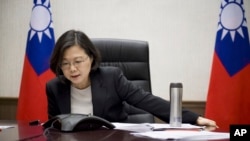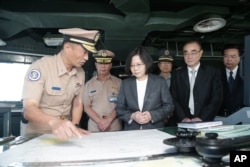China and the United States are sniping at each other over President-elect Donald Trump’s phone call last week with the president of Taiwan, but the exchange of hard words between them has largely missed Taiwan itself, and the island may ultimately gain from long-term closer contact with Washington.
That afterglow from the December 2 phone call between Trump and Taiwan President Tsai Ing-wen could ease Taiwan’s diplomatic isolation, bolster trade ties and give it a new edge in military defense against Beijing – its most likely foe in any conflict.
“I think from the outset (the call with Trump) is good for Taiwan,” said Shane Lee, political scientist at Chang Jung Christian University in Taiwan. “Tsai Ing-wen will have better access to the White House or to the administration in general. In what way, it’s hard to say. When Trump steps into the White House, he will have to talk with his advisers.”
Communist Party newspaper mocks the President-elect
China’s Communist Party-run Global Times newspaper expects more trouble than ever between the two superpowers after Trump takes office and says a lot of his words won’t turn into action. On Thursday, the paper’s website called him a “political rookie in wake of a protocol-smashing phone call with Taiwan.”
But tighter relations with the United States would also put Taiwan at risk of a backlash from China, which already distrusts Tsai. Taiwan has been self-ruled since the 1940s and polls show most Taiwanese oppose Beijing’s goal of unification with China. To isolate Taiwan’s government, China asks its 170-plus diplomatic allies to avoid formal contact with Taipei.
Washington broke ties with Taiwan in 1979 and switched to the larger, fast-growing China. But it has remained a staunch informal supporter of Taiwan since then.
Phone call from Trump may help Taiwan's military
Following the Trump phone call, Taiwan should expect more arms sales and better quality weaponry for its defense against China, said Ross Feingold, Taipei-based senior adviser with the American political risk manager DC International Advisory. Trump’s Asia advisers will want more military-to-military contact as well, he forecasted.
“There is also going to be people who are very supportive of higher-level military contact,” said Feingold. “The people who are advising on Asia policy, these are people who made it very clear they are very supportive of reducing the restriction on military-to-military contact.”
Taiwan has the world’s 19th biggest military compared to China at number three, according to the statistical database GlobalFirePower.com. It looks to Washington as its chief weapons supplier, though China’s pressure on the U.S. government to stop arms sales has spawned a homegrown defense industry in Taiwan.
Phone call could also have an economic effect
The 12-minute call to Trump may lead to deeper discussion of trade and investment cooperation than what President Barack Obama has offered, some experts say.
Trump’s administration may also try to help Taiwan open doors to international agencies where China blocks its access.
On the call, Tsai asked for American help in participating and contributing to those agencies.
More strategically, the Tsai government that took office in May should have the ear of Trump’s administration as needed, analysts say. Trump transition team member Ed Feulner pushed for the phone call, per media reports in Taipei. Taiwan’s foreign ministry on Wednesday thanked former U.S. Sen. Bob Dole for his “deep support,” though the president’s office says that contrary to some media reports, Dole's company did not arrange the phone call.
Tsai has expressed hope for meeting members of Trump’s transition team during a proposed stopover in the United States en route to Guatemala, a diplomatic ally, next month.
The phone call has ‘excited’ the people of Taiwan
Taiwanese are “excited” about the phone call as a sign that a U.S. leader cares about their homeland, said Ku Chung-hwa, standing committee member with the Taipei advocacy group Citizens’ Congress Watch.
People on the island have also made “psychological preparation” for a Beijing backlash since Tsai won the presidential election in January, he said.
May be a price to pay
Beijing resents Tsai for not seeing Taiwan as part of China, a precondition for any dialogue. Since her election over a candidate who took a friendlier view toward China, travel agents say Beijing has discouraged tour groups from traveling to the island and the Communist leadership has formed relations with a former Taiwan ally in Africa. China has also put Taiwanese fraud suspects on trial after being arrested abroad.
But China has avoided action that would upset Taiwanese to the point of pushing for constitutional independence. The constitution, written before the Chinese civil war, identifies Taiwan and China as part of the same country.
Scholars in Taipei warn of a stronger backlash, such as military threats or picking off some of Taiwan’s remaining 22 diplomatic allies, if Taiwan gets too close to the United States.
“A high expectation is not realistic politically and peacefully,” said Liu Yi-jian, public affairs professor at Fo Guang University in Taiwan. “I just don’t see (that) this thing will do Taiwan any good at this moment. I just don’t see the kind of high expectation on the part of the Taiwan people will help the peaceful resolution of the political conflict between two different sides of Taiwan Strait.”





